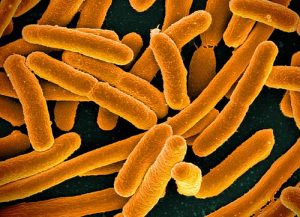Probiotics and Prebiotics Improve Blood Glucose Levels

Image: National Institutes of Health
In my book on the topic, I cover research showing that probiotics can improve blood glucose levels. But the research has been developing and needs more confirmation. New findings have since come out – need-to-know findings. Especially if you have type-2 diabetes, or pre-diabetes – marked by insulin resistance or glucose intolerance.
Just to be clear, insulin resistance is when the insulin receptors on the cell membranes become less interested to bond with insulin. When this happens, less glucose gets into the cells, and the cells have less fuel for energy. This not only results in fatigue, but increases blood glucose levels, as the glucose has nowhere to go.
The other, glucose intolerance, is sometimes related to insulin resistance, but can happen independently. In this case, the cell membranes become inhospitable to glucose. Whether this is related to insulin or not, the result is the same. Whatever glucose is in the blood cannot be consumed by the cells, leaving the blood high in glucose.
The biggest issue often leading to these situations is the dietary flooding of the bloodstream with glucose. This means overeating refined sugary foods – which spike the bloodstream with glucose after each meal and snack. When this happens repeatedly over a period of time, cells become tired of see-saw blood glucose levels and become intolerant to glucose and/or resistant to insulin.
In this article
Metabolic disease and high glucose levels
The problem with this situation is that when blood glucose levels are high, a myriad of other problems besides diabetes can result. Sure, the situation will result in fatigue and a pro-inflammatory metabolism due to the cells not being properly energized.
But when the bloodstream is flooded with glucose, tons of oxidative radicals will result. These radicals will damage tissues and blood vessels, causing inflammation and artery diseases. One of these is atherosclerosis – the hardening and stiffening of the arteries.
This of course can lead to strokes and heart attacks. On top of this, high blood sugar levels have also been linked with kidney disease and liver disorders.
This is why high blood sugar levels are typically associated with something called metabolic disease – which can include some or all of the above conditions.
So you see, it really makes sense to pay close attention to your refined sugar consumption, and your fiber intake.
But are there other things you can do to reduce your blood levels of glucose?
Glad you asked. (Okay, I asked, but hypothetically, you asked too. 🙂
Probiotics and prebiotics reduce blood sugar levels
This might sound odd to some people. That supplemented probiotics and prebiotic foods that feed them will cut blood sugar levels. Really?
Researchers from Australia’s Griffith University and Central Queensland University conducted a meta-analysis study of clinical research over the past few years with regard to probiotics and blood sugar levels.
The researchers found 14 clinical studies that treated people with some combination of probiotics and/or prebiotics, and tested their blood glucose levels.
These were done with a variety of different probiotics, sometimes with prebiotics. Some of the studies tested patients with one particular species/strain of probiotic. Others tested patients with combinations of multiple species of probiotics. Other studies tested probiotics in combination with prebiotics.
A meta-analysis is a universal calculation that captures the mean findings of all the studies combined. For example, if there were two studies in a meta-analysis, with one leading to a 50% improvement and the other leading to a 40% improvement, the meta-analysis would yield a 45% improvement.
That said, the meta-analysis conducted by the researchers was consistent with the Cochrane quality assessment criteria, which judges the studies’ quality based upon randomization, placebo comparison and so forth.
The clinical studies analyzed ranged in size and study period, but they all lasted several weeks. Ranges included six weeks to 28 weeks. Many of the studies included overweight or obese subjects, with some being diabetic (Type-2) or pre-diabetic.
The researchers based their assessment on high fasting blood glucose levels. This means blood sugar levels after a period of fasting. Usually these tests are done in the morning before the morning meal, meaning the patient had time to digest their dinner meals.
The researchers found on average, those who consumed either a single probiotic or multiple strains and/or prebiotics reduced their fasting blood sugar levels by an average of -0.18 mmol/L (millimoles per liter).
This was not considered by the researchers as a real significant reduction. However, when the meta-analysis calculated the effects of probiotics/prebiotics for those who had higher levels of blood sugar – equal or above 7 mmol/L – the improvement was significant. For these folks, probiotics/prebiotics reduced fasting blood sugar levels by an average of 0.68 mmol/L.
Also, those studies that used multiple strains of probiotics also resulted in greater reductions of fasting blood sugar levels. Multiple species tests resulted in an overall reduction of 0.31 mmol/L of fasting blood glucose levels. This is among all test subjects, with high or low levels of fasting blood sugar levels.
I should also add that some of these studies were done – in my opinion – using substandard probiotics and/or prebiotics. That is, probiotic delivery systems that likely resulted in very few of the probiotic colonies surviving the stomach acids and getting into the intestines.
Furthermore, many of the studies supplemented probiotics without appropriate prebiotics. This can also result in a retarded colony growth.
Learn more about probiotics and how to use them:
All of these points equate to the same conclusion: That a proper probiotic supplementation plan – using probiotic foods, prebiotics and supplements – will significantly reduce fasting blood sugar levels.
Other metabolic factors reduced by probiotics
Probiotics also affect HbA1C levels. In one study from 2015, 60 diabetic patients were given a fermented milk with Lactobacillus casei, Lactobacillus acidophilus and Bifidobacteria for two months. The probiotic group’s blood sugar levels went down from 179 mg/dl to 170 mg/dl. But their HbA1C levels also significantly decreased as well, from 7.6 percent to 6.4 percent.
The result of these types of changes will be to reduce levels of oxidative radicals in the blood, and reduce inflammation within the cardiovascular system.
This was illustrated in one of the studies reviewed. This 2014 study tested 38 people with metabolic syndrome. Half were given 200 million CFUs of seven strains of probiotics plus fructooligosaccharides (FOS). The other half received a placebo.
After 28 weeks of treatment, the probiotic/prebiotic group had 0.80 mmol/L reduced levels of total available glucose. They also had significantly reduced insulin resistance and reduced fasting blood sugar. In addition, the probiotic group had significantly lower LDL-cholesterol levels (pro-inflammatory) and significantly higher HDL-cholesterol (anti-inflammatory) levels compared to the beginning of the trial and compared to the placebo group.
So, you see, probiotics are not only good for digestion and blood sugar. They are also good for the heart.
REFERENCES:
Nikbakht E, Khalesi S, Singh I, Williams LT, West NP, Colson N. Effect of probiotics and synbiotics on blood glucose: a systematic review and meta-analysis of controlled trials. Eur J Nutr. 2016 Sep 3.
Eslamparast T, Zamani F, Hekmatdoost A, Sharafkhah M, Eghtesad S, Malekzadeh R, Poustchi H. Effects of synbiotic supplementation on insulin resistance in subjects with the metabolic syndrome: a randomised, double-blind,placebo-controlled pilot study. Br J Nutr. 2014 Aug 14;112(3):438-45. doi: 10.1017/S0007114514000919.
Ostadrahimi A, Taghizadeh A, Mobasseri M, Farrin N, Payahoo L, Beyramalipoor Gheshlaghi Z, Vahedjabbari M. Effect of probiotic fermented milk (kefir) on glycemic control and lipid profile in type 2 diabetic patients: a randomizeddouble-blind placebo-controlled clinical trial. Iran J Public Health. 2015 Feb;44(2):228-37.
Adams C. Probiotics – Protection from Infection: Using Nature’s Tiny Warriors To Stem Infection and Fight Disease. Logical Books, 2012-2014















